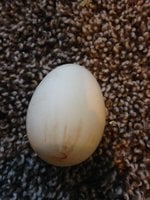ben0125
Songster
This afternoon I came home to feed our 15-week old rooster and 2 hens, they are a cross breed of Plymouth rock & Silkie, however, out of the corner of my eye I see a little white egg (The mother lays the same colour egg) in our little bush. I didn't think a chicken would lay so early? Is this normal, or am I doing something wrong???
If it helps the rooster has been crowing and fertilizing our bigger hens for a few weeks now.




If it helps the rooster has been crowing and fertilizing our bigger hens for a few weeks now.





 I was concerned at first, but so far she has had no issues laying the eggs other than the regular straining that I see all my new layers do during their first month or so of laying.
I was concerned at first, but so far she has had no issues laying the eggs other than the regular straining that I see all my new layers do during their first month or so of laying.